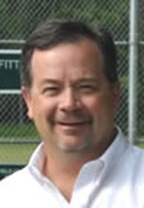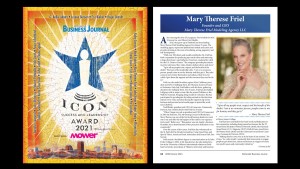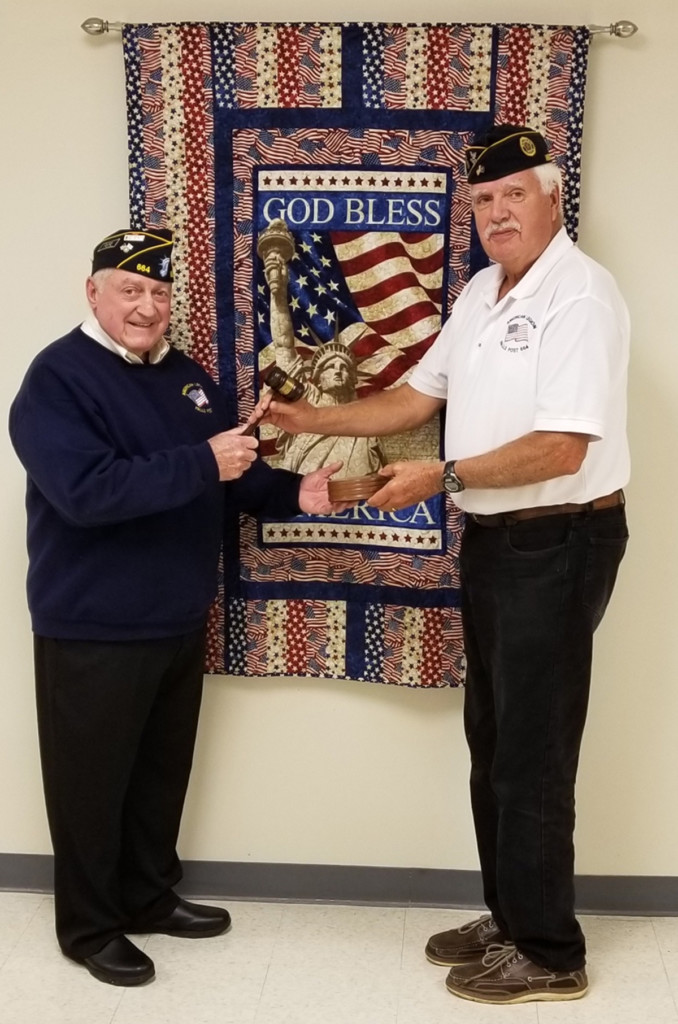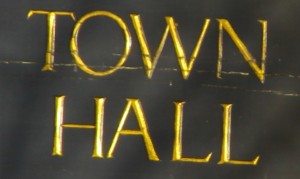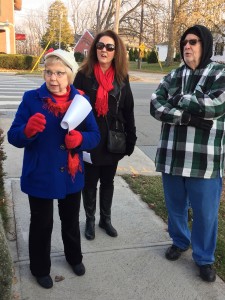 BY DEB AND TIM SMITH
BY DEB AND TIM SMITH
HIGH SCHOOL ~ As the piercing rain was pelting the pitch that portentous afternoon, Victor Coach Tim Smith watched as his left winger, David Wright cued up a corner kick in Canandaigua. Corner kicks were David’s specialty. As the coach watched, David Wright lofted a booming arching drive that managed to elude the hands and heads of every player on the field and gently curve to find a home, tucked into the back corner of the far side of the net.
At that moment the coach was thinking about how good it felt to be assuming a 1-0 lead over an arch rival. One thing the coach was certainly not thinking was that four decades later he and his wife Deb would be interviewing accomplished actor David Grant Wright prior to his induction into the Victor Performing and Visual Arts Hall of Fame.
The Cottage Hotel of Mendon has recently become a go-to spot for Victor High School anniversaries and reunions. Last fall when the 40th anniversary of boys varsity soccer at Victor was celebrated, the reception was held at the Cottage. Last week, when one of the players on that first Victor team that Smitty coached was inducted into the Hall of Fame, the Cottage again served to host the reception for that event. Victor loves the Cottage.
Perhaps, ironically, David never participated in performing arts during his high school years at Victor. He did however admit to silently savoring the Shakespeare plays he read in high school English classes. While being a starter on the varsity soccer team, David’s best high school sport was swimming where he excelled in the butterfly and breast stroke.
MICHIGAN STATE UNIVERSITY ~ Also a strong student, David applied to half a dozen colleges and was accepted at all of them. He shared a story with the quirky set of circumstances which came to dictate his college decision. One Monday in April of 1979, he came home from school to find a letter with a return address from Michigan State University. Upon opening the letter he was pleased to be praised with the news, “Congratulations, you are a Spartan.” That night he watched Magic Johnson lead the Michigan State Spartans to the NCAA College Basketball Championship defeating Larry Bird’s Indiana State Sycamores. It seemed like fate . . . Michigan State.
After arriving at the East Lansing campus, it would still be a few more years before his acting ability was actualized. His major was telecommunications which he summarized as essentially the entertainment business from the other side of the camera. But during his classes those first two years, there would arise circumstances where the teachable moment required one of the students to assume an acting role within the context of the class.
On one such occasion David was called upon to portray the part of King Henry IV from the Shakespeare play of the same title. After that class two very attractive girls approached him and flirtatiously complimented him on his penetrating performance, giving David cause to pause and reflect that, “This might be for me!”
During his junior and senior years at MSU David immersed himself in the theater. The University puts on two Shakespeare plays per year and he had major roles in consecutive productions of A Midsummer Night’s Dream, Romeo and Juliet, Twelfth Night and Macbeth. We asked David if he had to take sword fighting lessons to which he laughed and responded, “Yes, absolutely, and that reminds me of a funny story.”
SWORD FIGHT ~ While playing the part of Romeo, the plot, at one point of the story, has that lead character engaging in a sword fight with the villainous Tybalt. Of course Romeo is fated to prevail in this perfunctory petulance, but not until after a full minute of carefully choreographed thrusts and parries would move the actors back and forth across the stage.
The choreography of this conflict had the fight beginning with Romeo slashing his sword in a downward angle which Tybalt raises his sword to block. As Romeo/David makes first contact, the blade of his sword breaks off and goes flying into the orchestra pit. The panic pulses on multiple levels. There’s the personal concern that the flying projectile might cause injury as well as the dramatic concern of how to improvise and salvage the scene.
After seeing the sword safely settle, David’s gaze returns to his costar who he sees mouthing the words, “End the fight.” The 60 seconds of sword fighting will certainly seem silly with only one of the combatants actually armed. Subsequently this Shakespearean sham ends with Tybalt abruptly succumbing to a stub stab, to coin a term.
CALIFORNIA DREAMIN’ ~ After earning his Master of Fine Arts Degree at Michigan State, David could have played it safe and opted to settle in to a lower profile but steady paying acting gig in Chicago. But rather than play it safe, he decided to roll the dice and head for Hollywood, high hopes haughtily held in hand. It was a gamble that did not immediately pay dividends.
David admittedly struggled for much of his first decade in California. He did make a connection with the Old Globe Theatre in San Diego and appeared in multiple productions there. In order to make ends meet, he also taught acting classes at the University of San Diego. It wasn’t Hollywood, but he was surviving as well as honing his skills. It would be the early 90’s before David would return to LA where things would begin to fall into place for him.
MOST EXOTIC LOCATION ~ We asked David what was the most exotic site at which he had filmed. The answer to this one was actually connected to a commercial for a drug named Lyrica, which is currently running. It continues to air frequently and of course it can’t help but strike the viewer when you see a commercial prominently featuring someone you personally know. The storyline of the ad involves David frolicking with his granddaughter on the beach. To watch the commercial you would think it could be pretty much any beach. Turns out, not so.
The Lyrica commercial was shot on the beach in Cape Town, South Africa, which of course begs the question, “Why?” The three of us collectively laughed at that scenario and David said, “I didn’t get it then, and I don’t get it now. I’m living in freakin’ California – we have our own beaches, right? But when they told me we were flying to South Africa for the shoot, I thought ‘Great, I’ve never been there, let’s do this.’ Wanna see my South African penguin pictures?” Sure enough the penguin pics were produced.
We next asked David what he was working on now and he shared that he had been working on a commercial for the cholesterol drug Praluant. “If it weren’t for old white men’s diseases,” he quipped, “I wouldn’t have a career.” This is a perfect example of his hilariously self-deprecating humor.
COMMERCIALS ~ The next question that occurred to us after David’s old-white-men-diseases joke was based upon the fact that we have seen his Lyrica commercial so many times. We asked, “If you appear in a commercial, do you just get one lump sum when it’s done, or do you make more money if the commercial is aired more often?”
“That’s actually a great question,” David responded, “and the answer is not nearly as simple as you might suspect. Here’s a breakdown of the process. If hired to do a commercial I am initially paid a ‘holding fee’. For example, if Hunts ketchup hires me to do a commercial, the holding fee dictates that I cannot go out and do a commercial for Heinz ketchup.”
“The next step is that, after the commercial is shot, I do receive one lump sum that covers everything for most channels over the next three months. The exceptions to the ‘most channels’ reference would be that if your commercial runs on one of the four major networks; ABC, CBS, NBC & Fox, those are considered ‘Class A National Commercials’, and I would receive an additional payment every time one of my commercials appears on any of those four networks.” David added that all of this is subject to revision based upon currently ongoing union negotiations.
FINANCIAL SECURITY ~ After having David share with us his struggles to make ends meet during the early years of his acting career, we asked him if there was a breakthrough moment when he crossed the bridge from “I hope this is going to work out” to “at least I know I’m financially secure”. Probably to no one’s surprise, unless you’re one of a few elite exceptions, is the fact that carving out a successful Hollywood acting career is usually not something that comes quickly or easily.
David was in his mid-30’s when he felt he’d ascended the mountain to the point where he reached that plateau which would sustain a lifetime career. It probably would have made for a more flamboyant story if David could have said that plateau moment was achieved through his guest part on NCIS Los Angeles with Chris O’Donnell or “The Office” with Steve Carell.
And again defaulting to his self-deprecating sense of humor, David Grant Wright cites his plateau moment as the series of commercials he did for Jiffy Lube in the 1990’s. His oft-repeated line from those ads was, “I’m Jack from the J-Team at Jiffy Lube.” He ended up doing over 100 versions of this commercial, which were recreated on a quarterly basis, all of this contributing to his financial good fortune.
Why so many versions? The commercial was recorded in 15, 30 and 60 second-versions and also in a “donut version.” The “donut version” was a term we had never heard before and we asked David for an explanation. We’re thinking that his answer will probably be news to most of you, and as we see our job as an ongoing effort to inform as well as entertain, here’s the official Hollywood definition of a donut commercial. This is a commercial that is produced in two short components both of which serve as bookends, surrounding another segment, and subsequently appearing about 60 seconds apart from one another.
Think of it this way. Your regularly scheduled show fades to a commercial and David leads with a short Jiffy Lube intro which is followed by a segment with no David. After that, David returns to conclude, bringing the process full circle. Donut completed.
And finally, adding an international flair to the financial success of this sequence was the fact that the commercials were going to air in Canada, as well as the U.S. So at this point David is saying, “God bless the metric system.” Because every one of these commercials got recorded twice, with David’s lines as “Jack from the J-Team at Jiffy Lube” being repeated with the number of gallons replacing the number of liters.
MOST BIZARRE STORYLINE ~ Our next question to David was, “What was the most twisted tale you were a part of telling?” His eyes lit up immediately as if he had a slam dunk answer, and indeed he did.
“Have you ever seen the AMC series Fear the Walking Dead?” he asked. We admitted we had never seen the series and after hearing him describe the scene in which he appeared, we feel like we may have chosen wisely in this regard. During David’s guest star slot in this series, he plays a father at the wedding of his daughter. The daughter is played by Schuyler Fisk who is the real-life daughter of Sissy Spacek.
As the wedding reception progresses, the time arrives for the obligatory father/daughter dance. As David and Schuyler gracefully float about the dance floor, one might be lured into a false sense of security, thinking they are watching a wonderfully whimsical wedding. But alas, one would be wrong. They don’t call it Fear the Walking Dead for nothin’.
Halfway through the dance, Daddy David has a heart attack and drops to the floor. Daughter Dearest drops down to deliver mouth-to-mouth resuscitation. The daughter successfully brings her father back to life, but of course at a price. Daddy David does come back to life, but unfortunately, it’s as a zombie who takes one appetizing look at his Daughter Dearest, and bites her face off.
Not that we really needed to hear this last part, but David shared that in post-production, special effects technicians were able to create the effect enabling viewers to look through the hole in the side of her face and see her teeth. We feel the point to be made here is that if you ask David for “twisted” the man can deliver.
HILARIOUS COMMERCIAL ~ After watching some of David’s highlight reels, we had a hands-down choice for his commercial which was the funniest. It’s a Bud Light commercial titled “Stranded” and it first aired during the 2010 Super Bowl.
It starts out with the survivors of a plane wreck spread out on the beach looking scared and disheveled. David is playing the role of the plane’s pilot. A sexy female passenger approaches the group excitedly shouting, “Listen up, everybody; I found the plane’s radio equipment. I think we can get off this island!”
Immediately following that, another passenger, some distance down the beach, calls out with even more exciting news, “Listen up everybody; I found the plane’s beverage cart. It’s full of Bud Light!”
Pilot David initiates a party frenzy by proclaiming, “Here we go!” Immediately all the survivors abandon the girl with the lifesaving radio equipment and rush toward the beverage cart. The irony which is central to the humor is of course the implication that if there’s Bud Light to be had, who wants to get rescued?
There are other humorous nuances to be enjoyed. There’s a dude emotionally talking to a bottle of Bud Light as if he were trying to comfort a distraught child, passionately proclaiming, “We gonna be okay.” Next, the sexy girl who found the radio equipment is on the verge of contacting the outside world to effect a rescue when the same dude turns her radio dial to music so people can dance.
Adding to the carnival atmosphere, partiers are lined up to take joy rides down the plane’s emergency slide. There is also a giant beer keg functioning as a Jacuzzi. Initially you see the Jacuzzi keg occupied by a dude and two chicks. Then Pilot David enters the screen returning to the Jacuzzi with Bud Lights in hand. A closer examination reveals the fact that one of the chicks in the Jacuzzi is wearing David’s pilot hat. Surf’s Up!
INTERESTING ANALOGIES ~ There were a couple interesting analogies that came up in our discussions with David. Obviously as he gets older so do the roles that he plays, but there is some typecasting that goes along with this concept that may not be immediately apparent. “In military scenarios,” he says, “I used to play the pugnacious private while now I play the respected general. In the courtroom, I used to play the fiery lawyer, whereas now I’m more likely to be cast as the revered judge.”
The other of David’s analogies that resonated with us was one where he compared the concept of playing soccer for Smitty in high school to acting. “Sports is actually the true drama. You’re never sure what’s going to happen and there’s always the possibility that victory can be snatched away by defeat. When I play Romeo, I know I’m going to win that sword fight every damn time. It’s kind of ironic when you think about it, but in one sense the genre that is called ‘drama’ doesn’t truly have any.”
A SHOULDER TAP ~ Next, we’re going to close by getting serious for a few paragraphs. In February of 1993, David Grant Wright felt a tap on his shoulder. It was cancer. And cancer had a message for David which was, “I hope you don’t have any plans for the next five months.” It is not the kind of message a 32-year-old man wants, or expects, to hear. This is hardly a spoiler alert because the fact that we are writing about a recent interview with him clearly conveys the copacetic conclusion of his cancer conundrum.
So what do you do when life deals you a hand like this? In David’s case you turn your miracle of life into a lesson which will become a blessing for others. David began writing a one-man play chronicling his experiences encountered during the course of his treatment. He completed and published this project in 1995 under the title With Flying Colors.
In this piece of writing he manages to treat this difficult topic with an inspiring combination of compassion and humor. The subtitle he uses effectively sums up this concept by referring to his work as, “A true story of family, friends, angels, medicine, magazines, nuns & jello; told with laughter, love and inspiration.”
He has performed this one-person play hundreds of times across the country, and has used With Flying Colors to raise many thousands of dollars for the care and comfort of cancer patients. The book has been acclaimed by medical professionals, care givers, patients, and spiritual leaders. With Flying Colors is a true story of survival guaranteed to hover in your heart for a long time.

